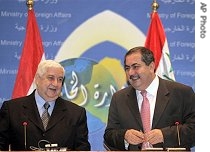2006年VOA标准英语-Iraq, Syria Restore Relations(在线收听)
By Margaret Besheer
Irbil
21 November 2006
Iraq and Syria have fully restored relations severed more than 25 years ago. Many hope the move will help stem spiraling sectarian violence inside Iraq. But in a heated session of parliament Tuesday, Sunni and Shi'ite deputies blamed one another for the violence and neither side called for a halt to the bloodshed. VOA's Margaret Besheer has more from northern Iraq.
Iraq and Syria severed relations more than 25 years ago, when Syria threw its support behind Iran during the eight-year-long war between Iraq and Iran.
 Syria's Foreign Minister Walid Moallem, (l), and Iraq's Foreign Affairs Minister Hoshyar Zebari attend media conference in Baghdad, Nov. 21, 2006 |
||
Iraq's foreign minister, Hoshyar Zebari, said both countries would re-open their embassies immediately and there would be cooperation on all fronts, especially security.
Syria is widely believed to have done little to stop foreign fighters from crossing its border to join Sunni insurgents in Iraq. It also has provided refuge for many top members of Saddam Hussein's former leadership and political corps, which is thought to have organized arms and funding for the insurgents. The hope now is that renewed relations between the neighbors will encourage Damascus to stop the border crossings, and help Iraq get on the road to peace and stability.
But as outsiders debate whether Iraq is slipping toward a civil war, the country's parliament Tuesday did nothing to allay those fears.
Senior political leaders traded angry words and accusations, but neither side called for an end to the sectarian attacks and counterattacks that have been terrorizing Baghdad and its surrounding areas for nearly a year and left thousands of Iraqi civilians dead.
Shiite parliamentarian Jalal al-Dine al-Sagher warned that if the leaders of Iraq's army are not quickly replaced, and the killing and kidnapping of Shiites does not stop, supporters would be unleashed to seek revenge against them.
Iraq's Ministry of Defense, which is responsible for the army, is Sunni-led.
Adnan al-Dulaimi, the deputy head of the Association of Muslim Scholars and one of the most influential Sunni Arab members of parliament, lashed out at his Shiite counterpart. Dulaimi accused Jalal al-Dine al-Sagher of being the instigator of attacks against Sunnis, saying his supporters have killed and kidnapped Sunnis and burned their mosques and attacked their homes.
While the legislators engaged in a war of words, more than a dozen Iraqis were killed across the country.
Separately, Iraqi and American forces conducted more raids in Baghdad as they continue to try and break up illegal militias responsible for rampant kidnappings and murders.
In one operation, troops detained members of an alleged kidnapping cell operating out of the Shi'ite stronghold of Sadr City in eastern Baghdad. The U.S. military said one of the people detained is reported to have first-hand information regarding an American soldier who was abducted last month.
In another Baghdad raid, the military says it killed three suspected terrorists and detained four others.